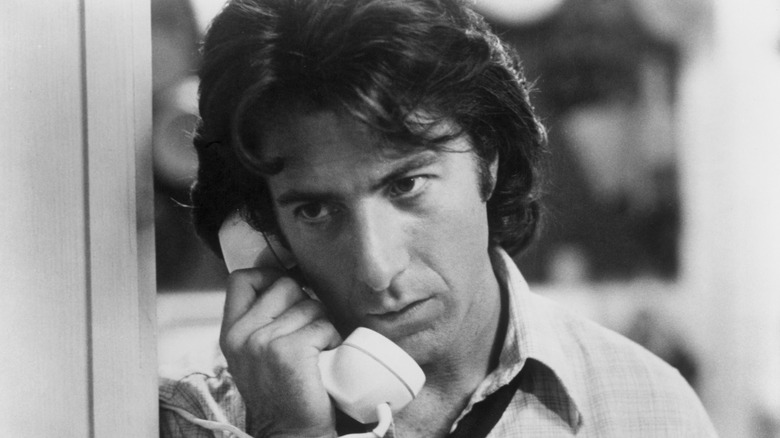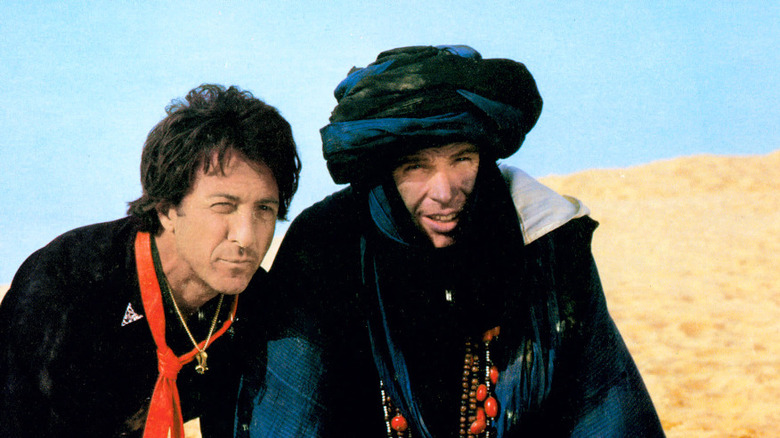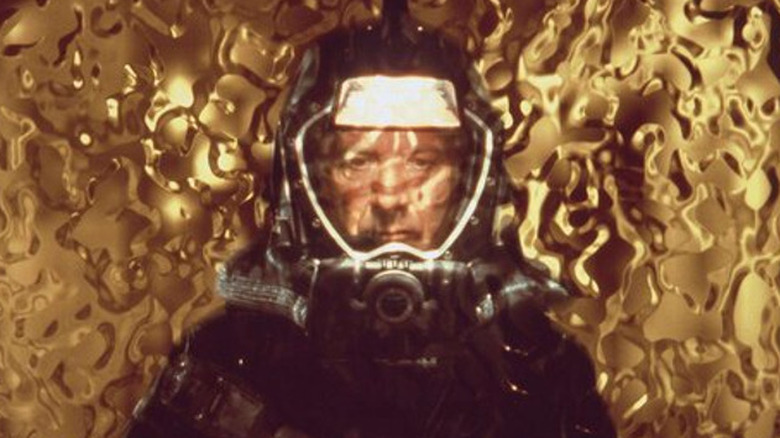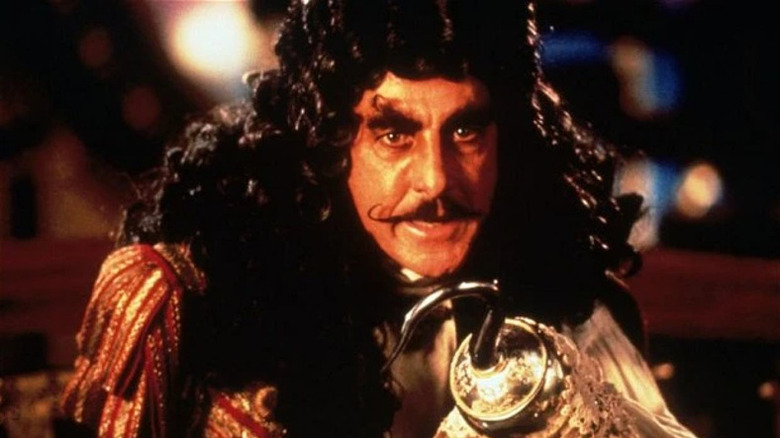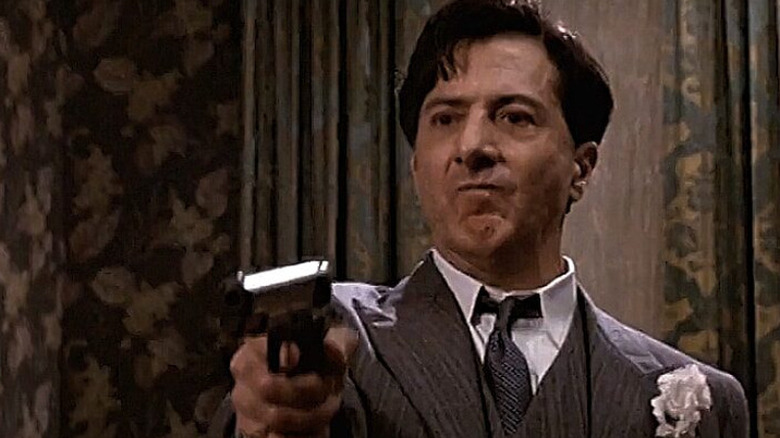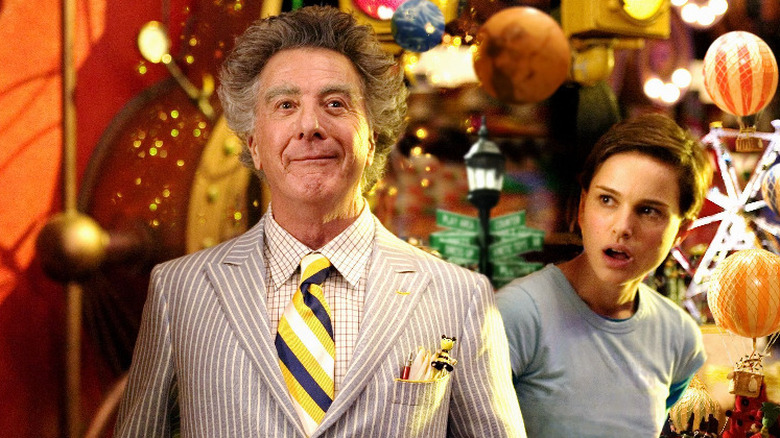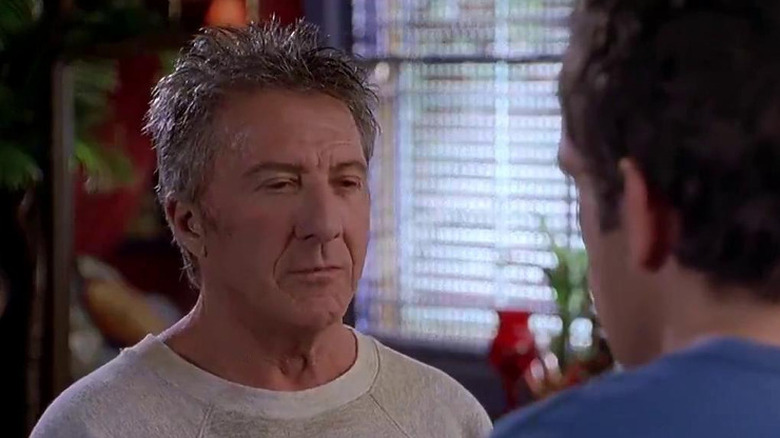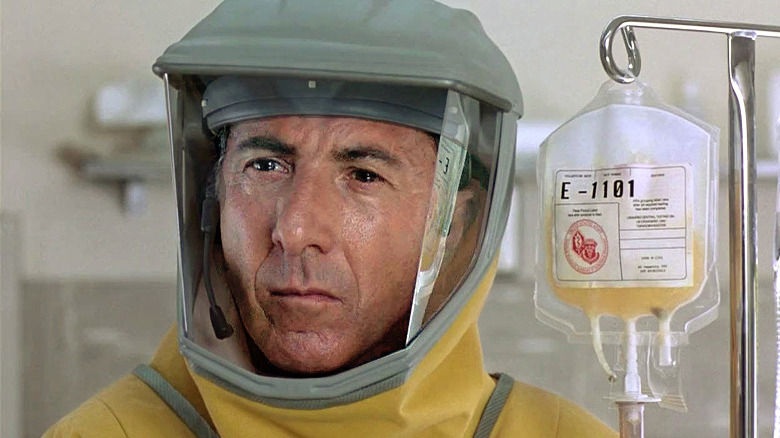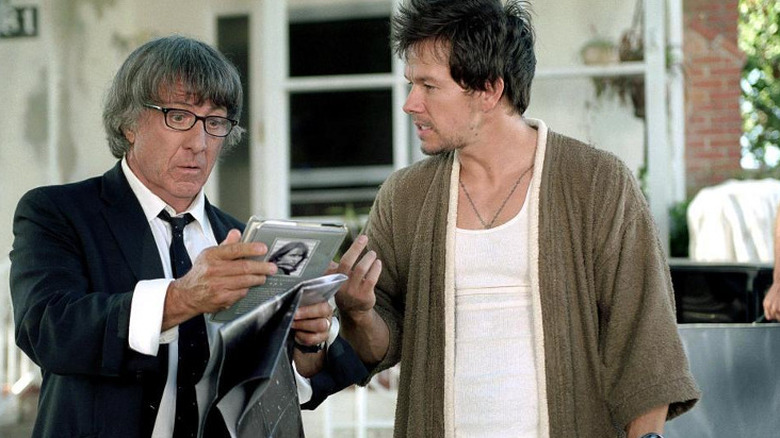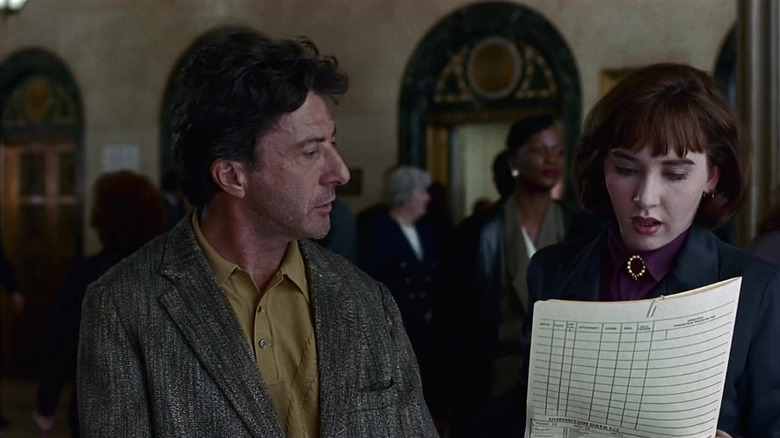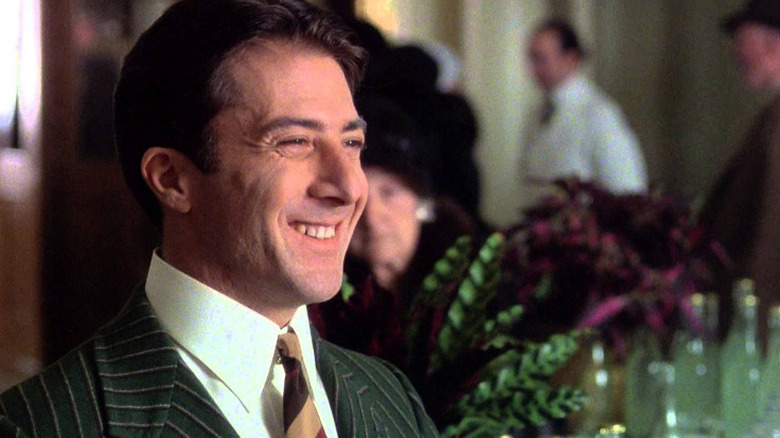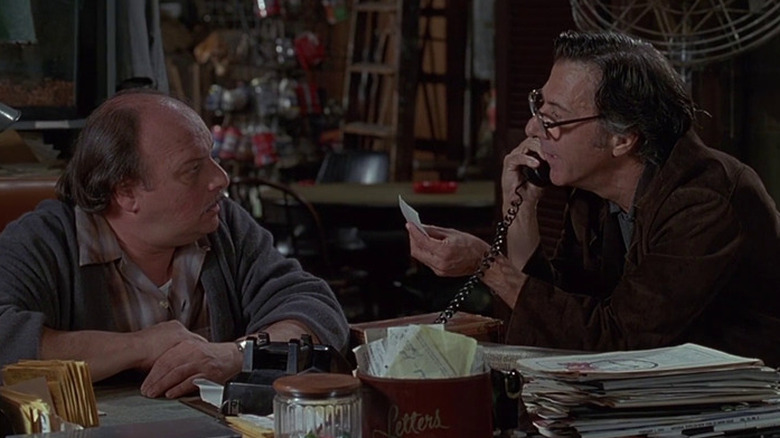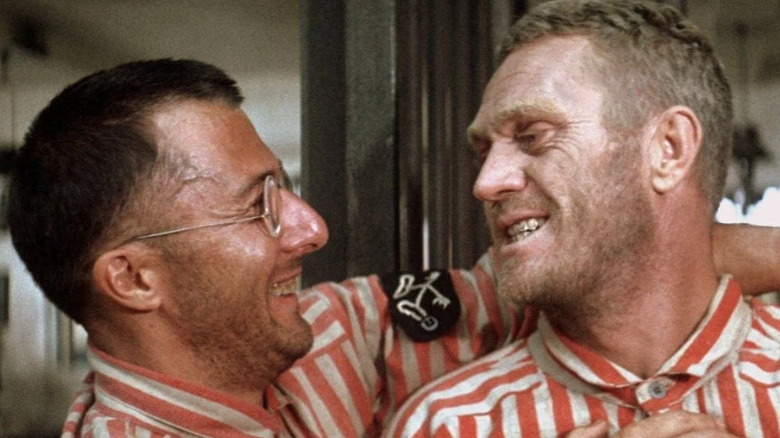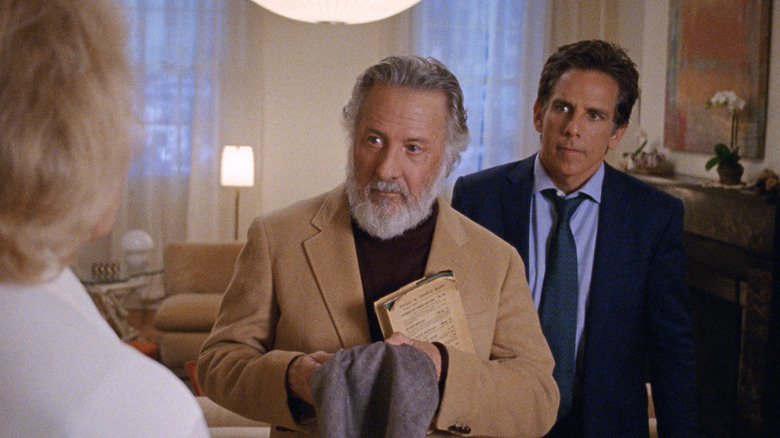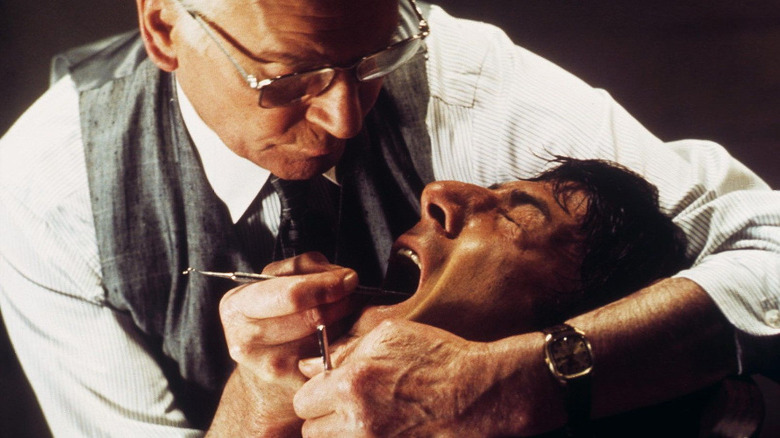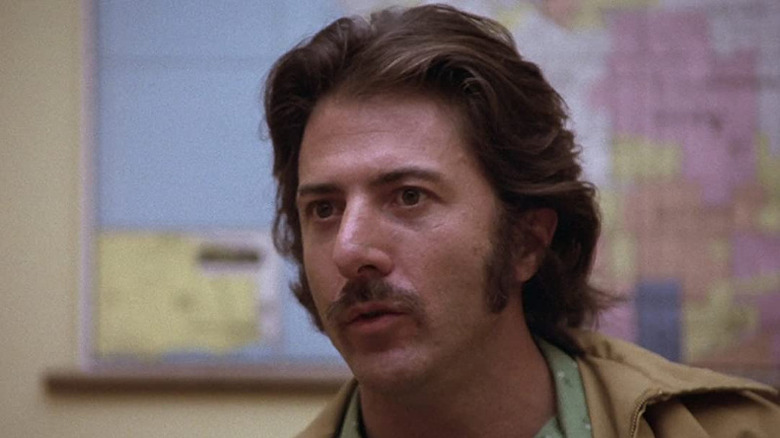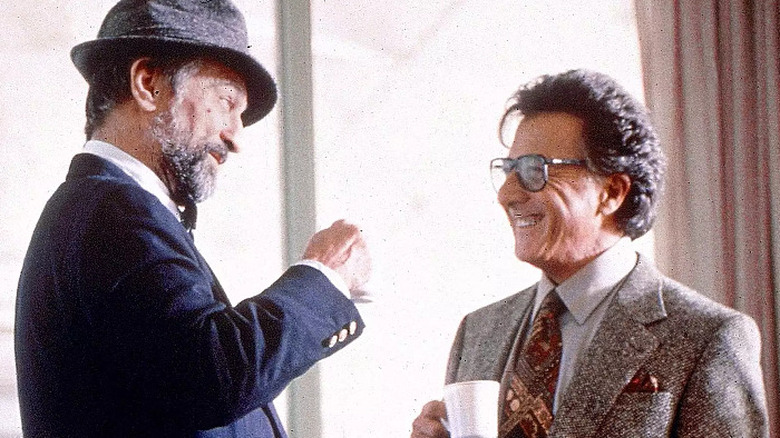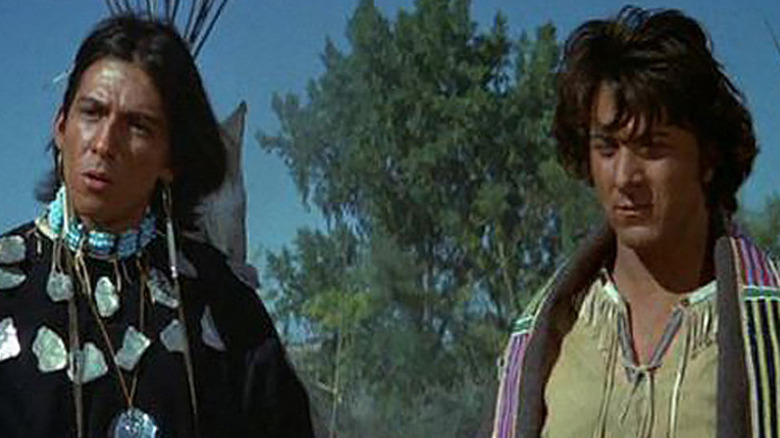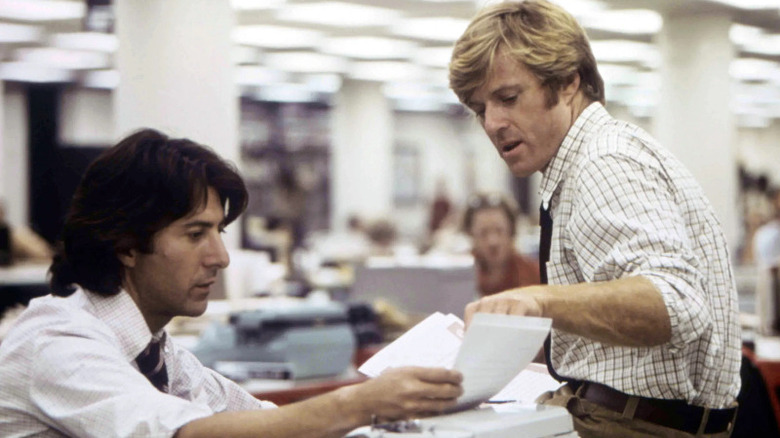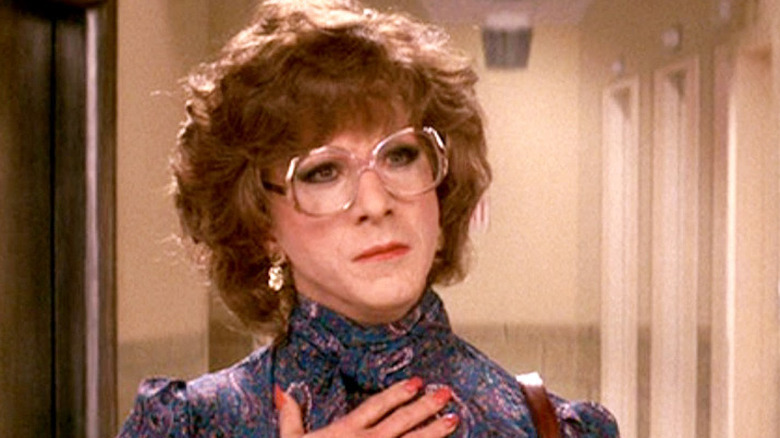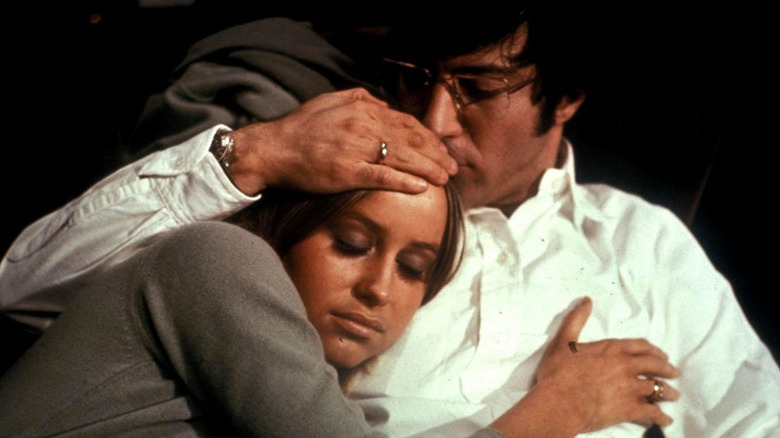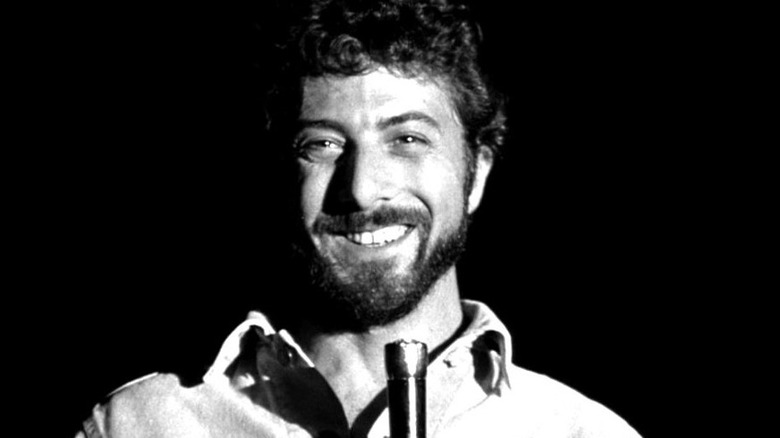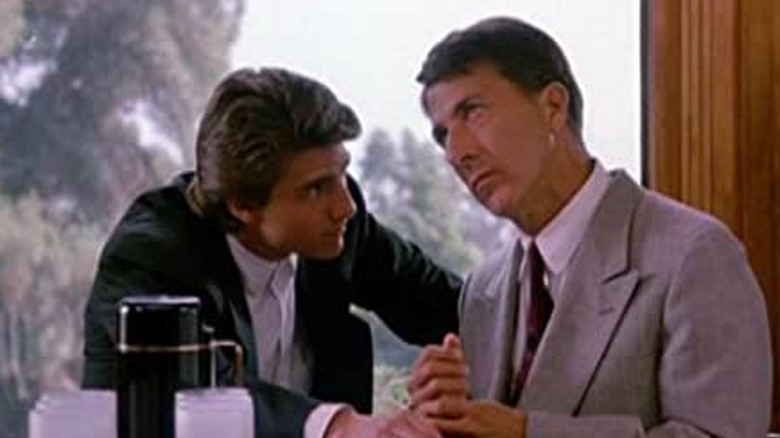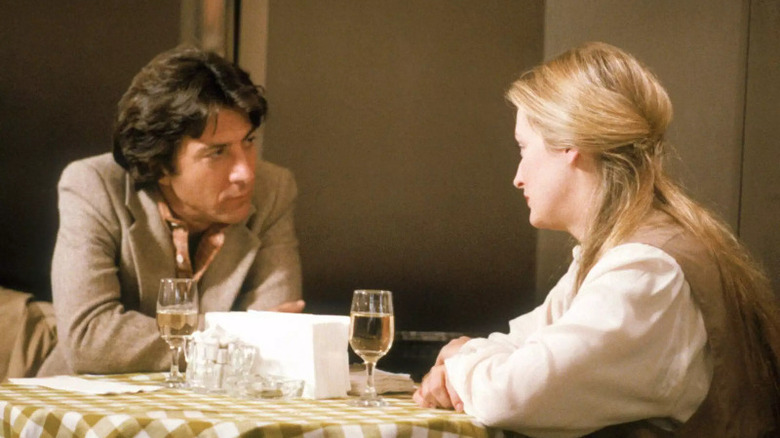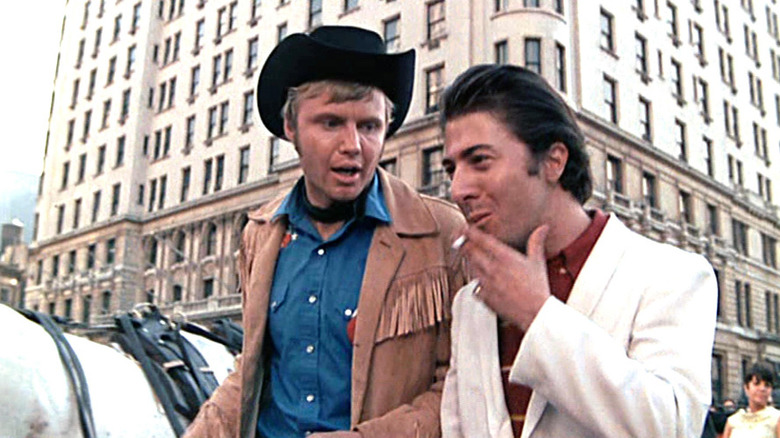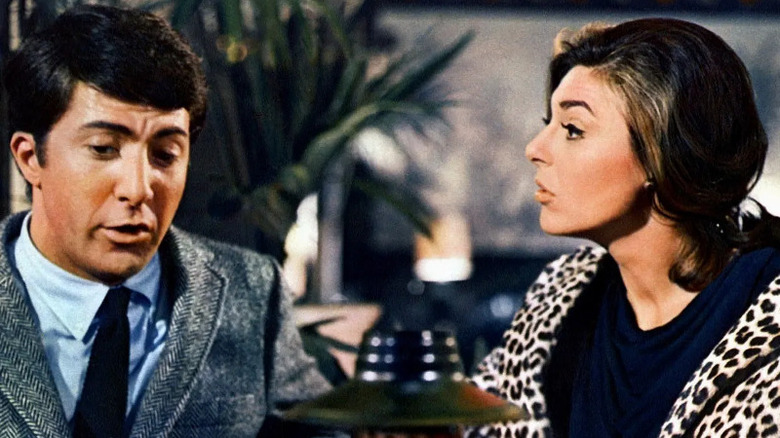The Most Memorable Roles Of Dustin Hoffman
A case could be made that Dustin Hoffman is the greatest living American actor, among the last of a handful of true movie stars. Of course, a case could also be made that Dustin Hoffman's legacy is tarnished.
No matter how you feel about the man, this much is indisputable. He's a two-time Oscar winner, nominated for Best Actor seven times in four different decades. He's one of the most famous Method actors, one who has been known to resort to extremes in an effort to fully inhabit his iconic roles in films like "Kramer vs Kramer," "Marathon Man" and "Lenny."
Hoffman was also a product of his times, coming of age at the dawn of the 1970's, an era that would soundly reject square-jawed leading men for the complicated visages of Elliott Gould, Al Pacino and Jack Nicholson. Here was an everyman who invested his roles with a nervous energy and charisma demanding your attention. Everything he seemed to touch entered the zeitgeist, from "Midnight Cowboy" to "The Graduate" to "All the President's Men" and "Straw Dogs." He became a counter-culture darling portraying mixed-up, confused, frequently angry young men. As he grew older, he expanded this range even further, becoming a box-office fixture in crowd-pleasers from "Rain Man" to "Tootsie" and "Outbreak."
Even the films that weren't box-office successes — Arthur Penn's "Little Big Man," the Edward Bunker-penned "Straight Time," Steven Spielberg's "Hook" — featured Hoffman taking big swings for the fences. These days, he seems to finally be slowing down, perhaps as the result of age or perhaps because of efforts to re-evaluate his legacy. Either way, it's hard to come up with a living actor who has starred in more classic films — below, a ranking of his most notable roles, ranked by the quality of the film, its place in the pantheon of his performances, and RottenTomatoes.com.
25. Ishtar (1987)
True, it might be Hoffman's worst movie. But it's also impossible to look back on the man's career without pausing for one of the most notorious bombs in the history of Hollywood.
Hoffman and Warren Beatty reportedly took on their roles in honor of screenwriter Elaine May, who did uncredited script rewrites on Beatty's 1981 Oscar-winning film "Reds" and Hoffman's "Tootsie." May pitched a comedy in the tradition of the Bob Hope and Bing Crosby "Road" movies, about two terrible singer-songwriters forced to take a gig in Morocco after failing elsewhere. Along the way, they would run into political shenanigans with rebels and the CIA. Released in 1987, the film's name would become infamous with Hollywood bad ideas.
Hoffman was reluctant to star as sleazy singer Chuck Clarke because he thought the action plot in Morocco took away from the heart of the film, but he did it anyway. Each lead was paid over $5 million for signing on, and May got paid over a million for her script and direction. The filming itself was a disaster, with Beatty and May at odds throughout and Hoffman often playing mediator. Each principal also had final cut, which made the film even more costly. In the end, "Ishtar" wound up costing $55 million and made just $14 million worldwide. It sports a 38% fresh rating on Rotten Tomatoes, with critic David Parkinson saying it was "one of the grossest miscalculations of the blockbuster era."
24. Sphere (1998)
Michael Crichton always excelled at plot-heavy, conceptual science-fiction via film adaptations of "Jurassic Park," "Westworld" and other books, but his characters tended to be interchangeable, which was a huge problem for 1998's Barry Levinson dud "Sphere."
Hoffman was still a bankable star when he was cast in this psychological, underwater, sci-fi thriller, and co-stars Samuel L. Jackson and Sharon Stone were near their peak powers as well. Starring as a psychologist, Hoffman's character had been recruited for his writing about alien life to a base where what appeared to be an alien ship had been recovered. An artifact that apparently had the power to control reality was also found, but that intriguing wrinkle was reduced to a lot of talking heads. Kenneth Turan of the Los Angeles Times said "The more the movie explains itself, the more ordinary it becomes."
It was a huge box-office flop, making just $37 million on an $80 million budget. It currently has just an 11% fresh rating on Rotten Tomatoes, and isn't even remembered as a so-bad-it's-good flop; it's just boring. Critic Leigh Paatsch of the (Australian) Herald-Sun said "It pays to be incredibly suspicious of a movie where nearly all dramatic tension is drawn from characters standing around bleeping computer screens and commenting on how bad things look." Even an actor as good as Hoffman couldn't elevate cardboard characters and flat dialogue.
23. Hook (1991)
Not even Steven Spielberg can hit a home run every time, and he was not pleased with his reimagining of Peter Pan in 1991's "Hook." Robin Williams starred as the boy who never grew up, only in this movie, he did grow up and had two children. The problem was that he forgot his true identity until former nemesis Captain Hook ( Hoffman) kidnapped them. Spielberg said that he liked the first act of the film but didn't like the fantasy sequences, because "my imagination only went as far as building physical sets and trying to paint trees blue and red."
The movie was a reasonable success, making over $300 million worldwide, although only $119 million domestically. That was on a $70 million budget, which was a good return but not at the expected blockbuster level for Spielberg. At the time, the only movie that ever had a bigger budget was "Terminator 2." It was a critical flop, with just a 29% fresh rating on Rotten Tomatoes. Roger Ebert of the Chicago Sun-Times said "The crucial failure in 'Hook' is its inability to re-imagine the material, to find something new, fresh or urgent to do with the Peter Pan myth" and said Hoffman acted "as if he were doing an imitation instead of a performance."
Hoffman based Hook's accent on political commentator William F. Buckley. His heavy costume "included a yak's-hair wig, a five-pound steel hook and an air-conditioning hose running up the back of his velvet waistcoat."
22. Billy Bathgate (1991)
Sometimes, even a great director, screenwriter, and a legendary star like Dustin Hoffman can't make a film work. Based on the E.L. Doctorow novel about the mobster Dutch Schultz, "Billy Bathgate" was directed by Robert Benton (of "Kramer Vs. Kramer"), Tom Stoppard wrote the script and Bruce Willis, Nicole Kidman, Stanley Tucci, and Steve Buscemi were all in it. Much like Bruce Willis' character, it deserved to be thrown overboard.
The flick stands at just 38% fresh on Rotten Tomatoes and was a box-office flop, making a mere $15 million on a $48 million budget. Its similarity to 1990's "Goodfellas" didn't do it any favors, as "Bathgate" similarly focused on a fish-out-of-water young gangster becoming part of an established world. The problem was that the actor who played the titular character, Loren Dean, played "a young man so bland and colorless that even becoming the protege of a gangster doesn't make him interesting," according to critic Roger Ebert.
Hoffman played Schultz but reportedly had trouble getting along with Benton. Stoppard completely changed the structure of the source material. Ebert said of Hoffman that Schultz was "one of his rare dispensable performances. There is nothing here — absolutely nothing — that needed Dustin Hoffman to do it." Other critics described the film as boring and joyless, even as it looked good. Sometimes, the magic just isn't there.
21. Mr. Magorium's Wonder Emporium (2007)
Dustin Hoffman can be a lot of things, but "whimsical" is not chief among them. That was the first problem with 2007's "Mr. Magorium's Wonder Emporium," a movie featuring Hoffman in the titular role as the ancient proprietor of a magic toy shop. It was so bland and deliberately courting a young audience that rough edges were non existent, leaving in its wake "Charlie and the Chocolate Factory" without the bite. Critic David Gritten of the Daily Telegraph (UK) said "there's nothing here to upset the children. (Not, that is, unless they're allergic to Hoffman's hammy, Method-derived acting)."
The film received just a 39% fresh rating on Rotten Tomatoes, making a modest $69 million worldwide. A film with Hoffman, Natalie Portman, and Jason Bateman simply shouldn't have been this dull, but it succumbed to one of the worst pitfalls of storytelling: the audience was constantly being told how magical and whimsical the shop and Mr. Magorium were, rather than shown.
Kudos to Hoffman for taking a risk and accepting a role so far out of his comfort zone, but the end product is anything but "Wonder"ful.
20. Meet The Fockers (2004)
After 2000's "Meet The Parents" became a surprise hit (riding the wave of Robert DeNiro playing against type in a broad comedy spoof), a sequel was inevitable, and pairing DeNiro with another late-career icon seemed like inspired casting.
In the original film, Ben Stiller's anxious Jewish character Greg Focker was trying to impress the WASP father of his girlfriend, leading to all sorts of cringe comedy. When it came time for the sequel, director Jay Roach cast Hoffman as Greg's dad Bernie and Barbra Streisand as his mother Roz.
"Fockers" had DeNiro transferring his mistrust of Stiller to Hoffman, who abandoned his job to become a stay-at-home dad. The result was an even bigger hit: over $500 million worldwide. However, it was rated as just 38% fresh on Rotten Tomatoes. While the Hoffman-Streisand pairing was generally praised in terms of their performances, critics like the Austin Chronicle's Marjorie Baumgarten said "The abundance of talent gathered for 'Meet the Fockers' is sadly shortchanged by the unimaginative script and directorial laissez faire." Sure, it was a crowd-pleaser, but a movie featuring two of the greatest actors alive should have been a lot more than an easy paycheck and toilet humor.
19. Outbreak (1995)
The contagion thriller "Outbreak" starred Hoffman as a military researcher named Col. Sam Daniels. For obvious reasons, the film about a virulent virus had a significant renewal in interest during the global COVID-19 pandemic, becoming one of Netflix's most streamed movies in March of 2020. This mix of science, politics, thrills, and romance was a big box office draw in its first run as well, making nearly $190 million worldwide. When it was released, it was predicated on a fear of extremely fatal diseases like ebola leading to mass outbreaks in the US.
Rather than rely on science to generate tension, "Outbreak" takes certain liberties in advancing the tension of its narrative. As such, it was frequently emotionally manipulative and easy to predict. Its essential quality as a potboiler was why it received just a 59% fresh rating on Rotten Tomatoes. Roger Ebert of the Chicago Sun-Times said of Hoffman's role that he "has been recycled out of dozens of other movies; he's the military version of that old crime standby, the Cop With a Theory No One Believes In." His sincerity makes the role work, but the over-the-top action sequences of the third act make him less essential than he was earlier in the film.
18. I Heart Huckabees (2004)
What better actor than Dustin Hoffman could you choose to star in an "existential comedy," as directed by David O. Russell? Hoffman played Bernard Jaffee opposite Lily Tomlin's Vivian Jaffe in 2004's "I Heart Huckabees." They were a husband-wife existential detective team, aiding a young, lovesick activist named Albert Markovski, played by Jason Schwartzman. What followed was a highly improvisational, loose series of performances about the intersection of transcendental love and nihilist absurdism, juxtaposed against an anti-capitalist ecological story. There was a lot going on here, and Hoffman chewed the scenery as Bernard.
An offbeat film like this had a modest $20 million budget and it made about that much worldwide. It's earned a 63% fresh rating on Rotten Tomatoes. Even if a viewer has no interest in philosophy or religion, the gags and pacing of the film move so quickly that the whole thing is fun to watch, not a chore. Schwartzman was terrified to work with Hoffman, saying "Dustin Hoffman is the reason why I wanted to become an actor and suddenly I was working with him." The bizarre methodology of the detectives included following them around and recording everything and zipping them up into blankets. Instead of being pretentious, it proved to be playful and weird, and that's thanks to the cast taking on this challenge head-on.
17. Hero (1992)
Dustin Hoffman has often been at home playing sleazy lowlifes who nonetheless manage to transcend their circumstances and touch the lives of others. A perfect case in point is 1992's "Hero," where Hoffman plays a thief named Bernie LaPlante. He's a study in contrasts as a man whose better angels compel him to help others in the most dire of situations, but whose personal demons lead him to rob them blind while doing so. In this case, he saved the lives of the survivors of an airplane crash, including a television reporter named Gail Gayley, played by Geena Davis. Of course, he also stole her purse and pickpocketed the wallets of many others he helped to save.
He tells a homeless Vietnam vet named John (played by Andy Garcia) about the rescue, and John takes credit in order to claim a reward. The film is a push and pull between them, as Bernie has to deal with going to jail for trying to fence stolen credit cards while the genuinely virtuous John accepts credit for what he didn't do. Even in the end, the sly brain of Bernie allows him to profit.
The film made a modest $19 million in the US but received a solid 67% fresh rating from Rotten Tomatoes. While it was more than a little sentimental, Hoffman's believably grimy performance helped cut through all that syrup.
16. Agatha (1979)
This Michael Apted-directed flick had as much drama off the screen as it did on. A fictitious account of what might have happened to famed mystery writer Agatha Christie when she disappeared for 11 days in 1926, it came from screenwriter Kathleen Tynan, who had been intrigued by the story and did a great deal of research, as she initially considered making it a documentary. Hoffman was also interested in the project and got the rights through his deal with First Artists Production. In exchange for taking no salary, he had total creative control over the project.
Because FAP required that Hoffman be one of the leads, a small supporting role was transformed into Wally Stanton, an American journalist obsessed with Christie. He follows her around after her husband leaves her for his secretary until he's able to figure out what she's going to. While not a full-blown romance, it's hinted at, and the writers balked at Hoffman's level of control, with Hoffman suing the studio for reneging on promises of total freedom. The critics enjoyed the abbreviated story, giving it a 71% fresh rating on Rotten Tomatoes. It made a modest $7.5 million at the box office after nearly being withheld from release, as the Christie estate tried to block it. Hoffman and co-star Vanessa Redgrave completely disappeared in their roles, and it was especially interesting to see Hoffman, known for somewhat seedy work, play the role of an effete society gentleman.
15. American Buffalo (1996)
What if Ratso Rizzo of "Midnight Cowboy" hadn't died? He might have wound up as the sleazy, greasy-haired loser Teach of 1996's "American Buffalo." A highly spare adaptation of the claustrophobic play by David Mamet, it's got the usual Mamet qualities. It's a satire and pointed critique of capitalism and the concept of hustling to succeed. It received a solid 74% fresh rating from Rotten Tomatoes with a limited release.
The plot follows Donny (played by Dennis Franz), plotting a heist with a young man named Bobby, played by Sean Nelson. The very premise points out Donny's incompetence, as he mistakenly sold a valuable Buffalo nickel from his run-down pawn shop. He schemed to get it back with Bobby, who frequently hung out in the shop. The shiftless Teach forces himself into the scheme, which disintegrates in a hail of mutual distrust. The appeal of the film is the taut, profane Mamet dialogue delivered in fast-paced, staccato style. Hoffman absolutely devours this, although there's a conflict between Hoffman's preferred naturalism and the mannered Mamet speech patterns. Anne Stilson of the Daily Telegraph (U.K.) said "Hoffman...never allows you to forget that he's reciting lines."
14. Papillon (1973)
Dustin Hoffman was often cast in films where small roles were made bigger to entice him to sign on. That was true of "Papillon," the gritty 1973 Steve McQueen-centered prison escape epic where Hoffman's character, forger Louis Dega, was greatly expanded from the original book. The film was based on the true story of Henri "Papillon" Charrière, a French man sentenced to a prison camp in French Guiana for the crime of murder. It's a grueling, visceral film lightened by Hoffman's comedic performance and the warmth of Dega's enduring friendship with Papillon. Papillon was a role befitting McQueen's status as an action film icon, while Dega's role as a schemer and comedic foil was perfect for Hoffman. The gorgeous backdrops (shot on location in Spain and Jamaica) helped offset the relentless cruelty portrayed onscreen.
It ran into budget problems but easily made back its $13 million budget, earning $53 million worldwide. While its grim qualities and deliberate, episodic pacing wasn't for everyone, it still earned a 77% fresh rating on Rotten Tomatoes. Richard Schickel of Time said that "Hoffman submerges himself eccentrically and amusingly in the coward's role." In 2017, a remake had Charlie Hunnam and Rami Malek attempting to update the classic.
13. The Meyerowitz Stories (New And Selected) (2017)
Fifty years after his film debut, Hoffman was still actively working and portraying complicated characters who were not necessarily likable. In 2017's "The Meyerowitz Stories (New And Selected)," Hoffman anchors an ensemble cast of comedic actors in a family drama. Directed by Noah Baumbach, it's the story of Harold Meyerowitz and his family. Harold (played by Hoffman) is a bitter artist whose work has mostly been ignored, and he's been relegated to being a teacher for most of his career. It co-stars Adam Sandler and Jean Marvel as Harold's children, and Ben Stiller as their half-brother, a successful accountant.
It currently sports a 93% fresh rating on Rotten Tomatoes and would rank higher on this list if it wasn't an ensemble piece. As the patriarch of a wildly dysfunctional family, Harold is impossible to please. He refuses to be part of a group show, especially when an old friend and much more successful artist gets a retrospective at the MoMA. He throws a fit when his accountant son tells him to sell his townhouse because Harold can no longer afford it. He causes a scene in a restaurant when he loudly complains about the prices, until his son says he'll pay. A highlight is a screaming match between Hoffman and Stiller, as the latter resents Hoffman's character choosing art over money.
Hoffman is clearly energized working with such a great cast, and Fletcher Powell of KMUW said "Hoffman is the best he's been in decades."
12. Marathon Man (1976)
Fewer words in the history of cinema are more chilling than "Is it safe?"
That iconic quote from John Shlesinger's "Marathon Man" is ranked #70 on the American Film Institute's 100 Greatest Movie Quotes Of All Time list, and arrives during one of the most brutal torture scenes in the history of cinema. Starring Dustin Hoffman as a grad student and runner named Babe Levy who gets mixed up with a Nazi war criminal, the film co-stars Sir Laurence Olivier.
Babe's brother Doc (Roy Scheider) is a spy who had dealings with Olivier's Zell, and Zell kidnaps and tortures Babe because he thinks he knows where his diamonds are. The diamonds were acquired from victims of the Holocaust, making Zell an especially repulsive villain. Zell tortures Babe with a dental drill on a healthy tooth with a live nerve, producing agonizing results. It's the calm, almost placid expression on Zell's face that makes him so terrifying, but Hoffman's portrayal of an everyman thrust into a nightmare is instantly relatable.
The movie has an 81% fresh rating on Rotten Tomatoes and it made $21 million. Hoffman's Method acting annoyed Olivier, and they reportedly clashed at times. When Hoffman told Olivier that in order to simulate his character being up for three days in a row, Hoffman actually stayed up to achieve that level of exhaustion, Olivier's famous response was, "Why don't you just try acting?"
11. Straight Time (1978)
Dustin Hoffman was always fascinating as a gritty low-life because he didn't have the tough-guy veneer of a Robert DeNiro, James Caan or Al Pacino. When Hoffman plays a criminal, one gets the sense that this person made a lot of questionable life decisions to get to that point, not because they were inherently bad. That was certainly true of 1978's "Straight Time," a story about a thief trying to go straight who decides that he will never get an even break, so he returns to a violent life of crime.
Based on the novel "No Beast So Fierce" by Edward Bunker (a real-life bank robber who later became a Hollywood fixture as an authenticity expert/larger-than-life bit player in films like Quentin Tarantino's "Reservoir Dogs"), the film earned an 82% fresh rating on Rotten Tomatoes, with some detractors simply unwilling to go along with Hoffman's thief character being so opaque. Vincent Canby of the New York Times praised it, saying "The movie makes no attempt to explain Max. It simply says that this is the way he is. It requires us to fill in the gaps, and it's the measure of the film that we want to." It co-starred Harry Dean Stanton, Gary Busey, and M. Emmett Walsh as a sadistic parole officer.
This was the first film of Hoffman's ill-fated relationship with First Artist Productions. He was initially tabbed to direct the film as well, but his perfectionist tendencies were so intense that he wasn't able to juggle acting, directing, and producing. He voluntarily quit, and it was turned over to Ulu Grosbard. He later sued First Artists (of which he was a member) over a creative control dispute.
10. Wag The Dog (1997)
The last of Dustin Hoffman's seven Oscar nominations came in 1997 for his role in this political satire, which told the timely late-'90s tale of a president caught up in a sex scandal. Released in theaters one month before the Bill Clinton-Monica Lewinsky story broke, the Barry Levinson-directed, David Mamet-written film cast DeNiro as a spin doctor who comes up with a scheme to confabulate a fake war in order to distract the press. To help him with the hoax, he hires a Robert Evans-like Hollywood producer named Stanley Motss, played by Hoffman. The film became a box office success and a cultural talking point, earning an 86% fresh rating from Rotten Tomatoes and making $64 million worldwide, an excellent figure for a prestige film.
Despite an all-star cast, it was Hoffman who stood out as the producer who manufactured a war against Albania, turned a psychotic soldier into a war hero, and helped get the president re-elected, all for nothing.
9. Little Big Man (1970)
Throughout much of his career, Hoffman was a bankable enough star, but he rarely seemed interested in the most commercial of films. A good case in point was Western satire "Little Big Man" where Hoffman played 121-year-old Jack "Little Big Man" Crabb, the oldest man in the world.
Telling his incredible story to a historian who dutifully recorded Crabb's frequently hilarious yarns, he had been raised by the Cheyenne, spent time with a hypocritical white family with his foster mother being sex-crazed, met Wild Bill Hickock, and worked for the infamous General Custer (a hilarious Richard Mulligan). The movie was a bitter send-up of traditional Westerns, and fairly progressive for the time, presenting the Native Americans as the sympathetic characters.
Hoffman was perfect for the role because he wasn't a typical action movie star, and Crabb was not a heroic character; he was just a guy who managed to live for a long time, see a lot of things, and have a deep understanding of the way things are. Hoffman's Crabb was funny, sad, furious, and simply a survivor. Hoffman wore a foam latex mask for his segments as the old man, which allowed a lot less facial mobility. Made with a $7 million budget, the film grossed $31 million worldwide. It earned a 96% fresh rating at Rotten Tomatoes, as its satire hit home.
8. All The President's Men (1976)
Considered by some to be among the best movies ever made, "All The President's Men" is one of the quintessential films of the '70s, with Dustin Hoffman and Robert Redford as its leads.
What makes this film unusual is that it was far more than a paycheck for Hoffman and Redford, two of the biggest movie stars in the world at the time. The movie is a dramatization of Washington Post reporters Bob Woodward and Carl Bernstein, whose investigation of the Watergate Hotel burglary led all the way to the White House, eventually forcing President Richard Nixon to resign in order to avoid impeachment. Working with a source known as "Deep Throat," they took his advice and "followed the money" as they were eventually able to make definitive links through tracking cash payments.
Early in their investigation, Woodward and Bernstein had little to go on. However, when Redford saw their first crack at the conspirators, he encouraged them to keep going and then bought the rights to their book about the investigation. Hoffman wanted to buy the rights as well, but was beaten to the punch by Redford, so he later cast him to co-star. The film has a 94% fresh rating on Rotten Tomatoes and made a whopping $70 million worldwide after a fairly modest initial budget of $5 million. Hoffman said that the relatively sparse characterization of the leads was intentional, because they didn't want to distract from the mind-boggling plot.
7. Tootsie (1982)
1982's "Tootsie" was a typical Hoffman production. This was a film that went through multiple screenwriters and directors before Sydney Pollack took the directorial assignment. Hoffman encouraged him to take an acting role in the film, but later battled him over the creative direction of the film. Hoffman didn't have final cut, but he did have a say in the editing room. Like with many of his films, Hoffman sued the studio for earnings withheld. "Tootsie" was about an unemployed actor named Michael Dorsey who has a hard time getting roles because he's hard to work with due to his perfectionism (not unlike Hoffman). Upon hearing about a role for a female character in a soap opera, he dresses like a woman and calls himself "Dorothy Michaels" in order to land it.
Playing Dorothy with a feminist bent, he becomes hugely popular. Things become problematic, however, when he falls in love with his co-star while at the same time having a girlfriend. To study for the role, Hoffman noted that he watched the cross-dressing farce "La Cage Aux Folles" multiple times. He also spent several months on the set of the popular soap opera "General Hospital" in order to get a sense of the rhythm of the show. The movie was a smash hit, making $177 million worldwide on a $30 million budget. It also has a 90% fresh rating on Rotten Tomatoes. "Tootsie" became a cultural phenomenon, also earning Hoffman his fifth Oscar nomination for Best Actor.
6. Straw Dogs (1971)
It's not surprising that a movie directed by maverick artist Sam Peckinpah would be Hoffman's most controversial. "Straw Dogs," released in 1971, was extremely violent and graphic, as most Peckinpah movies were, but there seemed to be less of a meditation on violence and more of an embrace of it with the reasoning that humans are inherently violent, territorial creatures.
The film follows mathematician and professor David Sumner (Hoffman) and his young wife Amy as they move to her house in southwest England to get away from volatile campus politics. David is a pacifist and icily contemptuous of Amy's rough-and-tumble origins, while she questions his passions. Her ex-boyfriend and his pals are hired to fix their roof, and they are contemptuous of him, killing the family cat. When some invite him hunting the next day as a prank, Amy's ex-boyfriend and another man rape her in the film's most controversial scene. A misunderstanding with a local man leads a lynch mob to David's house. He snaps, embracing his intrinsic violence and using a series of improvised traps and weapons to kill them all.
Critic Pauline Kael admired Peckinpah's artistry and Hoffman's performance while despising the violence, calling it "the first American film that is a fascist work of art." Though deeply polarizing, the film still has an 81% fresh rating on Rotten Tomatoes. Hoffman is deeply submerged in his role as ineffective intellectual in a way few other artists could have matched, making the film all the more shocking when he snaps.
5. Lenny (1974)
For a perfectionist and Method actor who fully immerses himself in his roles, playing infamous comedian Lenny Bruce in 1974's "Lenny" was a difficult experience. Bruce was known for his battles with the authorities over what was deemed obscenities in his stand-up act. He was frequently arrested, with the police even going so far as to plant people in his audiences. Toward the end of his career, the broken pariah stopped telling jokes during his routine, instead reading from his court cases in some misguided attempt to make sense of his downfall. He died of a morphine overdose in 1966.
Reporter Tim Cahill of Rolling Stone was on the set and said "It is, [Hoffman] keeps saying, his most difficult role: the most demanding in terms of his craft, the most shattering in terms of emotional outlay. 'I never played anyone who lived before. Someone who died only eight years ago.' Hoffman spent three months listening to the records, watching the films and reading the books. He interviewed more than 50 people who had known Lenny well. What he wanted was some small seed from Lenny that he could relate to his own life."
Hoffman noted a kindred spirit with regard to work ethic: "I know from my own experience that I'm most happy when I'm deep into my own work. Working was very, very important to Lenny. And that's why when the work was taken away after all the busts, he began to fall apart."
Hoffman earned his third Oscar nomination, and the film has an 89% fresh rating on Rotten Tomatoes.
4. Rain Man (1988)
"Rain Man" won Dustin Hoffman his second Best Actor award Oscar, made over $350 million worldwide in 1988, and has an 89% fresh rating on Rotten Tomatoes. It's the story of a shady car salesman named Charlie Babbitt who learns that he has an autistic brother named Raymond in an institution after his father dies. His father left his considerable inheritance to Raymond, managed through the institution. Desperately needing money, Charlie takes Raymond away, first in hopes of ransoming him and then trying to get him to custody. They go cross-country and eventually wind up bonding, and Charlie abandons his schemes.
The film was based on a man named Kim Peek that screenwriter Barry Morrow met. His remarkable powers of memory were mimicked by Raymond in the film. Hoffman did his usual level of intense research, meeting with and studying Peek's gait, gestures, and speech. Hoffman also spent time with autistic people and their families as well as consulting psychiatric and neurological experts. The result was perhaps Hoffman's most transformative role of his career, as he truly disappeared inside Raymond Babbitt and brought a tremendous sense of humanity to the role. Hoffman was initially offered Cruise's sleazy salesman role and Bill Murray was offered the role of Raymond Babbitt.
3. Kramer vs. Kramer (1979)
A film executive named Richard Fischoff read the manuscript for "Kramer vs. Kramer" before it was even a novel. He was struck by it because this story about a fairly young couple divorcing made him think that this would be the fate of Ben and Elaine from "The Graduate:" a moment of impulsive rebellion that slowly lost its luster over the years. The story was about Joanna Kramer leaving her husband Ted and young son Billy, the later trying to come back and reclaim him.
Hoffman turned down the part a few times. This was in part because of his own impending divorce but also because of his bitter experiences making "Agatha" and "Straight Time," which involved multiple lawsuits. Hoffman took it because of its focus on children, and he wanted to do the same in his own life. Streep became a star and won an Oscar with the part, which she felt needed to be more sympathetic than in the original book. Hoffman thought her ideal because she was using the pain of the death of her fiance John Cazale for inspiration. Hoffman worked closely with Justin Henry, who played Billy, building up a close rapport and improvising much of their dialogue together. Hoffman won his first Oscar for Best Actor, and the film was a big hit, making $100 million worldwide and earning an 89% fresh rating on Rotten Tomatoes.
2. Midnight Cowboy (1969)
A crucial film for Hoffman, because he wanted to show that he wasn't merely playing a version of himself in "The Graduate," John Schlesinger's "Midnight Cowboy" would convince the world Hoffman was an actor, not just a movie star.
Schlesinger was initially unconvinced that someone as clean-cut and mainstream-looking as Hoffman was the right man to play the role of lowlife wannabe pimp Ratso Rizzo. Hoffman met the director wearing "a dirty raincoat, battered shoes, greasy hair and three days of chin stubble" in New York's then sleaze central in Times Square. He got the job.
The film is about a young Texan named Joe Buck (played by Jon Voight) who comes to New York thinking he can be a male prostitute. He becomes friends with Rizzo, who thinks he can help this naive young man hustle. Rizzo is proud and angry, but he's also in poor health and living a lifestyle making things worse. Despite initially being rated X, it won the Oscar for Best Film in 1969. Hoffman earned his second Oscar nomination for playing Rizzo, whose improvised "I'm walking here!" line-reading is one of the most famous in film history. The film's reputation slowly built until it made $44 million worldwide with a budget of around $2 million. It has an 89% fresh rating on Rotten Tomatoes.
1. The Graduate (1967)
This was the movie that kick-started Dustin Hoffman's career in spectacular fashion, and it's still his most iconic role. 1967's "The Graduate" remains the apotheosis of young disillusionment and ennui. Hoffman stars as Ben Braddock, who just graduated from college and returns home to upper-class Southern California with little direction. He has an affair with Mrs. Robinson, a family friend, but later falls for her daughter Elaine.
"The Graduate" is jammed with iconic lines and scenes. It's a scathing satire of materialism, as the "Just one word: Plastics" line reveals. Ben's world unravels with the "Mrs. Robinson, you're trying to seduce me? Aren't you?" The final scene, where Ben interrupts Elaine's wedding and runs away with her, only to realize that they have no what they're doing, deflates the misguided romance of the whole film.
Hoffman was paid just $20 thousand and had to go on unemployment when he got back to New York. Director Mike Nichols also didn't make much, as he was mostly known for his theater work, like Hoffman. Improv comedian Buck Henry wrote the script with no real prior experience. It would up being the biggest box office hit of the year and made over $100 million worldwide. Geoffrey Macnab of The Independent (U.K.) praises "Hoffman's performance as Benjamin, which combines humor, boredom and panic in equal measure." It sports an 87% fresh rating on Rotten Tomatoes. Hoffman earned his first Oscar nomination for Best Actor with his first major film.
